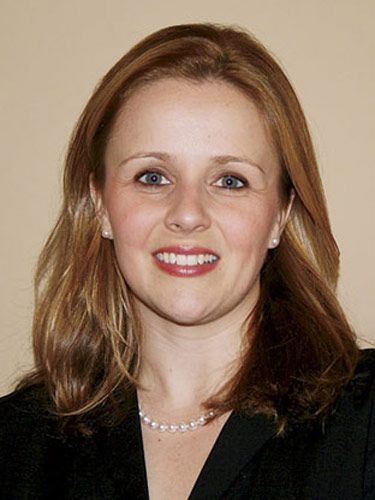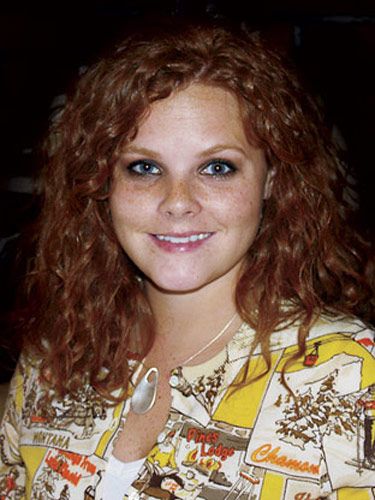True Stories of Crying at Work
Welling up in the office: Career suicide or the new way to get ahead? Real women weigh in

When Hillary Clinton got misty on the campaign trail, then went on to win the New Hampshire primary the next day, it wasn't just a pivotal moment for her. With women out-graduating and out-earning men like never before, that moment may have signaled that the fairer sex has finally redefined the rules of power. After years of forcing ourselves to act like men at work and blink back every hint of humanizing emotion for fear of looking weak (or like we've got serious PMS), could it finally be okay — and maybe even a good idea — to reveal ourselves a little? We asked five powerful women to weigh in on their own "Hillary moment." Did it compromise them, or catapult them to success?
CRYING PROVED I DIDN'T FIT THE CORPORATE MOLD.
Alicia Rockmore, 42, CEO, Ann Arbor, MI
The moment:
I made a major mistake when I was working at a multinational corporation that resulted in bad local press. It could have spiraled into a story in the national media. Some people at the company were very nasty with me. I cried most of the day that it happened. A lot of it was behind closed doors, in front of my boss.
The aftermath:
My boss wasn't very comfortable with my tears. He kept saying, "Calm down. It's okay," because I think he didn't know what else to say. I always felt there were repercussions — it created the perception I didn't fit into the corporate mold.
The takeaway:
I am a crier, and I finally realized that I couldn't be myself in corporate America. I started my own business, and now if I want to cry — or be happy — I don't have to feel inappropriate.

I BIT MY LIP SO HARD IT BLED.
Get exclusive access to fashion and beauty trends, hot-off-the-press celebrity news, and more.
Jamie Pennington, 32, former investment banker, now employment-agency founder, Atlanta
The moment:
When I asked my boss if I could approach some of the firm's lapsed clients to see if I could bring them back, I expected him to appreciate my initiative. I was shocked when he said no — then added that he didn't want me to embarrass myself or the company. He thought I wasn't ready, and it was a hurtful way to say it.
I felt the tears coming, but I refused to cry. I bit my lip and didn't say another word. At the end of the meeting, my lip was bleeding. I was the only female stockbroker on the desk, and crying would have validated the stereotypes about women in a male-dominated field. When I accepted the job, I knew I would have to prove myself every single day, and that included showing them I could take it and move on.
The aftermath:
My boss never came around, but I eventually won the backing of a senior director and went ahead with my plan — and became the top sales producer in the department. When I left to start my own business, my boss refused to shake my hand because he was watching millions of dollars in sales walk out the door.
The takeaway:
I'm a big believer in "Never let them see you sweat," but even more than that, crying would have allowed my boss and colleagues to use it against me throughout my tenure at the firm.

I WON BY FALLING APART.
Ashleigh Hansberger, 26, branding-firm principal, Myrtle Beach, SC
The moment:
I had made it to the final round of a national contest for female business owners. This was a big deal. On the rehearsal day, in front of the sponsors and organizers, about eight of the 15 other competitors gave their pitches before I did. All of a sudden, I felt an overwhelming sense of intimidation. By the time I got to the podium, I had zero confidence. I flubbed every line of my speech, and it kept getting worse and worse. I just lost it. I was crying hysterically, almost to the point of hyperventilation, right there at the podium.
The aftermath:
One of the business coaches from the competition who had witnessed the whole debacle ran into me in the elevator on my way back to my room. She said it was okay to cry and told me, "You really can do this. We selected you for a reason." My business partner and I stayed up all night rewriting the speech.
The next day, in front of live press and prestigious judges, I got up and delivered the pitch. I had nothing to lose; everyone had seen me break down already. I got a huge ovation, and I was one of eight winners.
The takeaway:
Breaking down like that and making myself come back again was such a confidence builder. Being in business, you're in uncomfortable situations a lot of the time. Knowing you can overcome that is priceless.

I SOBBED IN FRONT OF MY BOSS — AND GOT PROMOTED.
Sirmara Campbell, 28, human-resources manager, Chicago
The moment:
I joined the company when I was 19 and had been there for seven years. I felt like I was bumping my head against the ceiling and didn't think there was another spot for me. I hesitated to talk with my boss — the president and CEO — because I was afraid I was being pushed out by not being promoted. I have a lot of passion for this company, and I cried almost every day, at home and in front of colleagues, about possibly leaving. Finally, I scheduled a meeting with my boss, where I started sobbing.
The aftermath:
My boss gave me a hug and told me, "You've always cared so much about this company and given so much." Once I let him know what I needed from my career, he offered me the position I had always wanted as the human-resources manager.
The takeaway:
In retrospect, I see that all I really needed to do was talk to my boss about my goals. I didn't need to get so upset. But I have no regrets about crying, in this situation or in others. Our CEO is a big believer in this pro basketball coach who said that if you cry, laugh, and think, you've had a full day. But even if I worked elsewhere, I know I couldn't always hold in my tears, and I wouldn't want to. When you cry about something at work, it means you have emotion attached to it.

I ALIENATED COLLEAGUES — BUT GAINED A MENTOR.
Maria Reitan, 42, former executive TV producer, now public-relations principal, Minneapolis
The moment:
I had moved from Miami to Chicago to work as an executive TV producer. Chicago was a conservative, insular market, and the station had a lot of people accustomed to doing things a certain way. I was trying to make changes, and I got a lot of resistance. One day, I'd had it. I called the producers together and said, "What's going on here? Why are you giving me such a hard time?" I started getting emotional and just boohooed.
The aftermath:
I hoped to get a sign that my colleagues wanted to work with me, but they sat there with blank expressions. I immediately regretted it. I went directly into my boss's office and told him what I had done. In a newsroom, gossip flies fast, and I wanted him to hear it from me. He had come from another market and was getting the same backlash, and he confided that sometimes he wanted to cry. He told me to compose myself and go right back out to the newsroom. He left six months later for another job, but he remained a mentor for years.
The takeaway:
I'm glad I found an adviser, but I handled the situation poorly. If I were facing a hostile group today, I would step out of the room, get my bearings, go back, and conclude the meeting. You need to know your audience before you reveal that type of emotion.
Dedicated to women of power, purpose, and style, Marie Claire is committed to celebrating the richness and scope of women's lives. Reaching millions of women every month, Marie Claire is an internationally recognized destination for celebrity news, fashion trends, beauty recommendations, and renowned investigative packages.